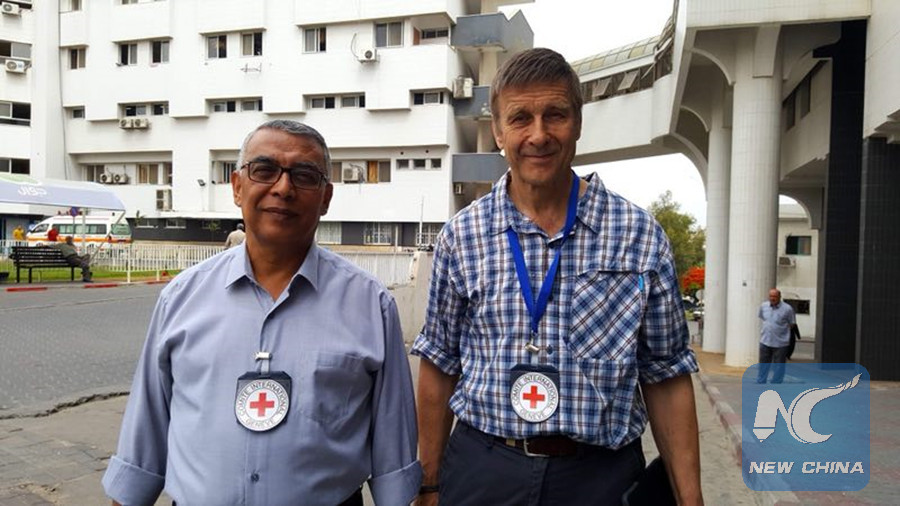
British surgeon Richard Villar (L) and Essam al-Sayd, a French doctor of Egyptian origin, came to the Gaza Strip to help save the lives of the Palestinians injured by Israeli gunfire during the recent clashes near the Gaza-Israeli border. (Xinhua)
GAZA, May 26 (Xinhua) -- Upon arrival in the Palestinian Gaza Strip, Richard Villar, a British surgeon with the International Committee for Red Cross (ICRC), rushed to the Al-Shifa Hospital in Gaza city to help save the Palestinian protesters injured by Israeli gunfire.
Villar arrived in Gaza one day before the mass anti-Israel Palestinian rallies peaked on May 14, leaving more than 60 Palestinians dead and thousands of others injured.
"This is the largest casualties I have ever seen in one day," Villar told Xinhua.
The British doctor is one of many physicians who came to help treat thousands of Gaza protesters injured during the mass rallies, known as the "Great March of Return," which kicked off on March 30.
Around 115 Palestinians have been killed and 13,000 others injured by Israeli since late march.
Villar is now helping Palestinian doctors at Gaza's largest hospital of Shifa.
"The number of the casualties was a surprise, but the nature of the casualties was not a surprise because I have been to conflict zones before," the 65-year-old doctor told Xinhua, adding that the majority of the wounds were in the lower limbs.
The doctor said he came to Gaza to help medical teams save lives, but he also said that he learned many things from Gaza doctors.
He affirmed that Gaza has excellent medical staff as they are well experienced in dealing with incidents, but he said the problem is with the availability of equipment, medications and disposable items.
Hospitals in Gaza have already been suffering from a lack of medical supplies, equipment, and electricity due to the blockade Israel has been imposing on the seaside territory since 2007.
The health ministry in Gaza has recently warned that the health situation in the Hamas-ruled territory is on the verge of collapse amid severe shortage of medicines and medical supplies.
According to the ministry, deficit in medicines reaches 50 percent, while there is a 27-percent shortage in medical consumables, and a 58-percent shortage in laboratory materials and blood banks.
Seven government hospitals out of 12 receive emergency cases during confrontations between Palestinian protesters and Israeli soldiers, according to health ministry in Gaza.
The ministry said the seven hospitals are struggling to deal with so many wounded amid shortage of human resources and supplies for operations.
The ministry has sent urgent appeals to international organizations to provide medicines and supplies to public hospitals in the Gaza Strip.
In a recent interview with Xinhua, World Health Organization (WHO) official Mahmoud Daher warned of the gravity of health situation in Gaza due to a large number of injuries.
Daher stressed that WHO is making efforts to urge the international community to provide more aid to government hospitals in Gaza, as well as projects worth millions of U.S. dollars to provide supplies, medicines, medical equipment and emergency trainings.
He said the aid provided until now is not enough as budget for health sector in Gaza is over 40 million dollars.
These warnings led Essam al-Sayd, a French surgeon of Egyptian origin, to come to Gaza to give a hand.
"I have dealt with large numbers of casualties since I arrived here," he told Xinhua.
He added that he and his colleagues at the Gaza European Hospital in Khan Younis conducted 30 surgeries on May 15.
"Most of the injured were shot in the lower part (of the body), which may cause future disabilities," he explained.
Sayd is supposed to stay in Gaza for three more weeks to help those injured in the ongoing clashes with Israeli soldiers.
"I will always come back to save lives here," he said.

